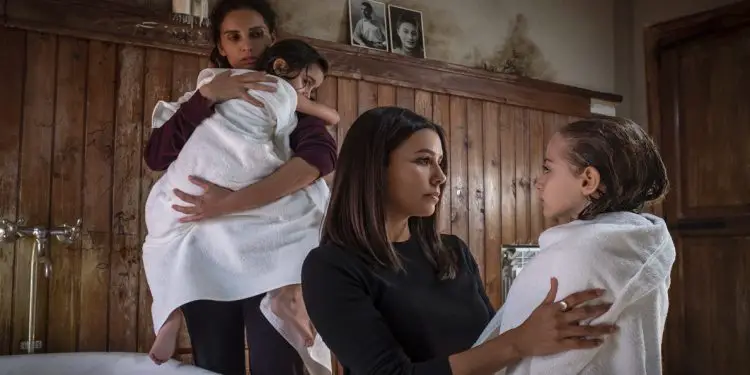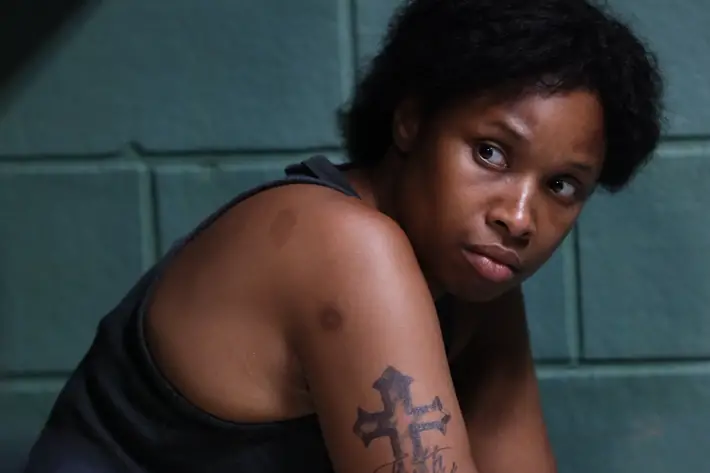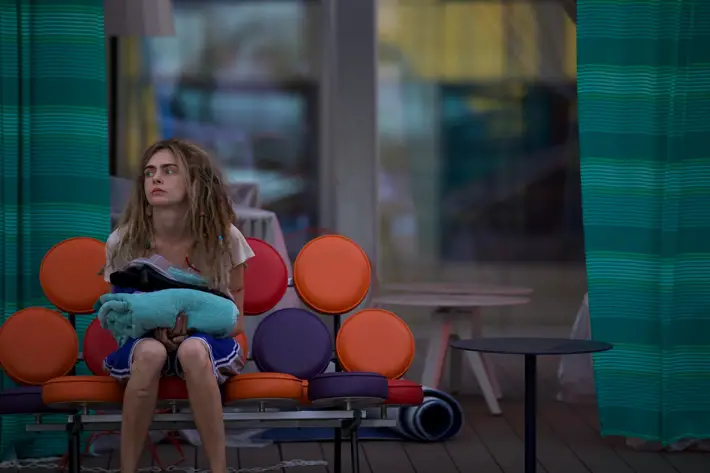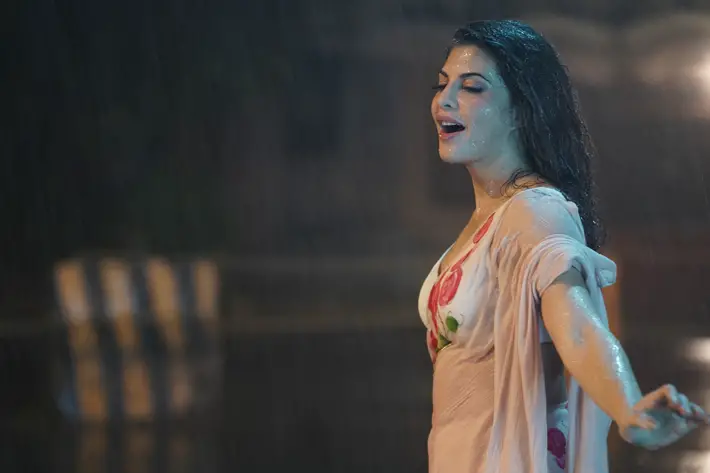Tell It Like A Woman (2023) – Film Review

Directors: Lucia Bulgheroni, Silvia Carobbio, Catherine Hardwicke
Cast: Cara Delevingne, Eva Longoria, Marcia Gay Harden
Certificate: 15
By Elizabeth Stanforth-Sharpe
Tell It Like A Woman is an anthology of short films, directed by women from across the globe, and featuring those who identify as women both in front of, and behind, the cameras. Originally titled ‘Women’s Stories’, the collection first premiered in 2022 at the Taormina Film Festival where it won the TFF Excellence Award, and was created to support the We Do It Together campaign, empowering women and promoting gender parity in films and media.
The common thread that binds the films together is that all have a female protagonist who has challenges to overcome in her life, which she masters with a determination and courage, bringing her new strength and self-awareness. It’s a formula that is only too familiar, and could err on the side of predictable, but the stories chosen – some true, some fiction – are saved slightly by their insights into social and cultural differences.
‘Pepcy and Kim’, a true story from America, re-told by Catherine Hardwicke and directed by Taraji P Henson, stars Jennifer Hudson as a female prison inmate who has dissociative identity disorder, named Kim or Pepcy, dependent upon which personality is having its moment to shine. Kim (Jennifer Hudson) wants to be considered for the release programme, but Pepcy behaves in a way that makes that unlikely. A sympathetic psychiatrist patiently unwinds a heart-rending history of sexual abuse, drug abuse and gang rapes, until Pepcy fades away, and Kim’s mental illness is treated. Reunited with her child, Kim became the founder and ambassador for the Time For Change Foundation, working to support children and women escape from homelessness, mass incarceration programmes, and traumatic backgrounds. In 2015, Kim Carter became a Top Ten CNN Hero. Whilst I’m not convinced that this was the right film to front this collection, ‘Pepcy and Kim’ gives a compressed insight into the challenges of multi-personality disorders and how they manifest themselves, but also how they can be mediated to purposeful effect; this story has ripe material for a fuller version to be made that would have served it better.
“New hope”
The second film, ‘Elbows Deep’, written and directed by Catherine Hardwicke, is also a true story, set in Los Angeles during the COVID lockdown. Over 66,000 people were living on the streets, and with hostels forced to close their doors, California set up Project Roomkey, which converted hotel rooms into isolated shelters, a team of voluntary medics making weekly rounds to check up on the health of the individuals housed there. ‘Elbows Deep’ follows two of the medics as they interact with a young woman who has schizophrenia and is filthy, refusing to wash, or change her many layers of clothes, and hoarding food even when it is rotting. She cannot move easily because she is wearing her ‘protection’; layers we later come to understand are indicative of the layers of responsibility and loss she has encountered in her life.
Validation (Cara Delevingne) has a serious wound on her arm that she has bound with bin liners held in place with wire taken from the coat hangers in her hotel room, an infection has got in, and she needs urgent medical attention. As Dr Partovi (Marcia Gay Harden) and her nurse begin to gain Validation’s confidence and peel away the layers, we see that one of her t-shirts has the slogan ‘In Women We Trust’ hidden on the inside; an unspoken acknowledgement that it is a trust that she does not give away lightly. Validation, stripped back to bare flesh, goes to shower, a new set of clothes waiting, and the possibility of a new hope ahead of her. The film then shows us the real Dr Partovi who continues to work with LA’s most vulnerable population, as medical director of Homeless Healthcare Los Angeles, where she is known as ‘The Renegade MD of Skid Row’.
“Gentle”
‘Lagonegro’, written and directed by Lucia Puenzo in collaboration with Tatiana Mereñuk, tells the story of a successful architect Ana (Eva Longoria, top image) who is, unwillingly, expected to take time from her busy schedule in London, to attend the Italian funeral of her sister, Sarah, from whom she was estranged. She expects she will be away for two days and regards it as two days too many. Discovering that Sarah had a daughter – Lena – is a shock. That she has been made guardian to the child is a greater one. Ana’s mother and sister had inherited mental illness which ultimately caused both to take their own lives, and she worries that Lena may be affected also; Ana escaped the condition and refused to have her own children to avoid the rogue gene being carried forward. Lena, unaffected by the illness, overhears Ana expressing her doubts and takes matters into her own hands, allowing Ana to recognise that there is more to life than back-to-back appointments and prestigious awards.
‘A Week In My Life’, written and directed by Mipo O, transports the viewer to Japan, where single mum Yuki (Anna Watanabe) is struggling to juggle the demands of childcare, work, and home routines, working late into the night, and becoming more and more exhausted. Reaching for a new box of tissues to mop up a spill, she sees that all the new boxes in a bulk buy have been opened, and then on Saturday, she returns home to find her eldest child, Aya, has gone to her grandma’s, leaving her younger brother unattended. When Aya returns home, she is reprimanded, but offers no explanation. On Sunday, a package arrives. Aya had been quietly collecting the tokens on the inside of the tissue boxes until she had enough to exchange for a robotic vacuum cleaner to make life easier for her mum and had slipped out to see grandma for help in filling out the transaction details. ‘A Week In My Life’ is a gentle little story, entirely voiced in the Japanese language, but easy to follow, that speaks of how sensitive children are to the needs of those they love, and how much difference understanding, and support makes in difficult situations.
“Surreal journey”
Voiced entirely in Italian, ‘Unspoken’, written by Guilia Louise Steigerwalt, and directed by Marie Sole Tognazzi is based on a true story of a veterinarian. It has slipped Diana (Margharita Buy)’s mind that she is supposed to be attending an event with her daughter and taking the pre-ordered food. When her daughter reminds her, she plans to leave her work early, but it seems that every animal in the city needs her aid tonight. She finally prepares to leave her practice, only to see a couple sat in the waiting room, the woman holding a dog with a bleeding paw. There is something about the man’s attitude that makes her uncomfortable, and when his back is turned, the woman, who does not speak Italian, shows Diana bruises on her arm. Diana realises that she has cut her own dog deliberately, to get out of the house and get help. Diana creates a situation to separate the couple, call the police and get help for the woman.
‘Sharing A Ride’ is co-written by Leena Yadav, Shantanu Sagara, Krupa Ge and Chiari Tilesi, with direction by Leena Yadav, is set in India, and draws attention to the abuse suffered by women and transgender who travel alone, and the measures being taken to address the issue. Divya (Jacqueline Fernandez) is surprised that the tuktuk that she flags down is driven by a woman, and the driver explains that the company ‘Women of Bombay’ is run by women for all who identify as women. Divya is asked to share the ride with a drag queen, Anjali (Anjali Lama), who is in town to compete in a drag competition with big monetary prizes. The following day, Divya, a cosmetic surgeon, is stopped by a traffic policeman, and recognises them as her fellow tuktuk passenger. Disillusioned by her rich patients’ obsession with what they perceive beauty to be, Divya begins a surreal journey into what true beauty means, understanding and compassion. Anjali comes from a small village where he was beaten as a child for dressing up in one of his mother’s sarees and dancing, and there’s a very beautiful moment where they dance in the pouring rain, unafraid and accepted by Divya. She and all the local children join the swell, laughing, smiling, and dancing with joy. It’s a colourful, glorious film that speaks loudly of acceptance, understanding, and breaking down barriers.
“Light and equality”
The final film, ‘Aria’, written and directed by Lucia Bulgheroni and Silvia Carobbio, takes the form of a silent, stunningly put together animation, accompanied by an equally lovely soundtrack, focusing on the concepts of breaking down stereotypical expectations, shattering glass ceilings and opening opportunities. It also, very subtly, pays homage to tearing up the rules around film and media; widening the aperture to allow as much light and equality in as possible. In isolation, this would be a terrific short around which to base discussions with older children and young adults.
In many ways, it is sad that there are still such inequalities that ventures like Tell It Like A Woman need to be conceived, but it is heart-warming to see a global collective give the piece voice, recognising that this is far more than a feminist protest or viewed from the perspective of privilege, and it gives some interesting glimpses into the lives lived outside our own often insular boxes.
The song that weaves through the anthology is ‘Applause’ written by Diane Warren and sung by Sofia Carson. It was nominated for the best original song category at this year’s Academy Awards, and is one of the strongest messages of empowerment here, acknowledging what every human being needs to hear, wherever they are in this great big world;
They can’t stop you, you were born unstoppable
Dare to know that you’re remarkable
Stand up, stand up
Raise your hands up, hands up, yeah
Give yourself some applause, you deserve it
Give yourself some respect ’cause you’ve earned it
Give yourself some love ’cause you’re worth it …
… You’re bold, you’re bad, you’re strong
So give yourself some applause…
(Applause lyrics © BMG Rights Management)













